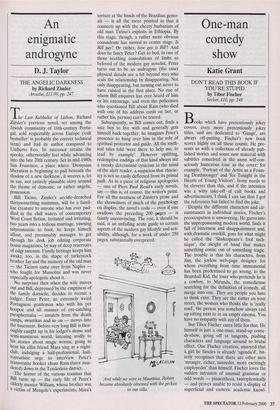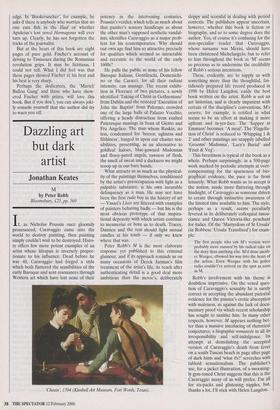One-man comedy show
Katie Grant
DON'T READ THIS BOOK IF YOU'RE STUPID by Tibor Fischer Secker, £10, pp. 248 Books which have pretentiously jokey covers, even more pretentiously jokey titles, and are dedicated to 'Gangs', are always off-putting. Fischer's new book scores highly on all these counts. He pre- sents us with a collection of already pub- lished stories and some new material with subtitles conceived in the same self-con- sciously humorous tone as the cover; for example, 'Portrait of the Artist as a Foam- ing Deathmonger' and 'Ice Tonight in the Hearts of Young Visitors'. Irony needs to be cleverer than this, and if the intention was a witty take-off of cult books and advertisements, I think I can say that I got the references but failed to find the joke.
Despite the different characters and cir- cumstances in individual stories, Fischer's preoccupation is unwavering. He gazes into the unprepossessing modern world, finds it full of bitterness and disappointment and, with dramatic overkill, goes for what might be called the 'Shakespeare's fool tech- nique', the sleight of hand that makes something comic out of something tragic. The trouble is that his characters, from Jim, the joyless web-page designer for whom everything from time immemorial has been predestined to go wrong, to the Bramhall Kid, the loser who pretends he is a cowboy, to Miranda, the comedienne searching for the definition of comedy, all merge into one. They are people you hate to think exist. They are the nutter on your street, the woman who thinks she is 'really mad', the person you somehow always end up sitting next to in an empty cinema. You have no sympathy with any of them. But Tibor Fischer cares little for that. He himself is just a one-man, stand-up come- dy-show, going off at tangents, pushing characters and language around to brutal effect. One Fischer creation, annoyed that a girl he fancies is already 'agenda'd', bit- terly recognises that there are other men `stronger, richer, tanneder, more excitingly employeder' than himself. Fischer loves the sudden intrusion of unusual grammar or odd words — pinacotheca, tautophonically — and proves unable to resist a display of superficial and esoteric academic knowl- edge. In `Bookcruncher', for example, he asks if there is anybody who worries that no one eats fish in the Iliad or whether Apuleius's lost novel lierniagoras will ever turn up. Clearly, he has not forgotten the tricks of the journalist.
But at the heart of this book are eight pages of pure gold. Fischer's account of driving to Timisoara during the Romanian revolution grips. It may be fictitious, I could not tell. What I did feel was that these pages showed Fischer at his best and his best is very sharp.
Perhaps the dedicatces, the 'Martel/ Ballou Gang' and those who have show- ered Fischer with prizes, will love this book. But if you don't, you can always joki- ly console yourself that the author did try to warn you off.



































































 Previous page
Previous page